| Listing 1 - 10 of 11 | << page >> |
Sort by
|
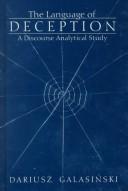
ISBN: 076190915X 9780761909156 Year: 2000 Publisher: Thousand Oaks, Calif. Sage
Abstract | Keywords | Export | Availability | Bookmark
 Loading...
Loading...Choose an application
- Reference Manager
- EndNote
- RefWorks (Direct export to RefWorks)
Discourse analysis --- Deception --- Sociological theories --- Pragmatics

ISBN: 0761909168 1452220344 1452262101 9781452262109 9781452220345 076190915X 9780761909156 9780761909163 Year: 2000 Publisher: Thousand Oaks, Calif. : Sage Publications,
Abstract | Keywords | Export | Availability | Bookmark
 Loading...
Loading...Choose an application
- Reference Manager
- EndNote
- RefWorks (Direct export to RefWorks)
This book employs a discourse analytical approach to the study of deception. It focuses on the deceptive messages themselves - how language is used to deceive others and what kinds of linguistic devices are used. The author develops a theory of deception based on his study of debates and interviews of American and British politicians.
Deception. --- Discourse analysis. --- Discourse grammar --- Text grammar --- Semantics --- Semiotics --- Chicanery --- Deceit --- Subterfuge --- Truthfulness and falsehood --- Intrigue --- Discourse analysis --- Deception
Book
ISBN: 9781350109025 1350109029 1350005738 1350005746 1350005754 1350005762 Year: 2017 Publisher: Bloomsbury Publishing
Abstract | Keywords | Export | Availability | Bookmark
 Loading...
Loading...Choose an application
- Reference Manager
- EndNote
- RefWorks (Direct export to RefWorks)
Abschiedsbrief. --- Discourse analysis. --- Discourse analysis. --- Last letters before death. --- Last letters before death. --- Mann. --- Men --- Men --- Men --- Men --- Selbstmord. --- Suicide victims --- Suicide victims' writings. --- Suicide victims' writings. --- Suicide victims. --- Identity. --- Identity. --- Language. --- Language. --- Correspondence.
Book
Year: 2007 Publisher: Basingstoke Palgrave MacMillan
Abstract | Keywords | Export | Availability | Bookmark
 Loading...
Loading...Choose an application
- Reference Manager
- EndNote
- RefWorks (Direct export to RefWorks)
Developmental psychology --- Affective and dynamic functions --- Sociology of the family. Sociology of sexuality --- Labour market --- Sociolinguistics --- Identity --- Masculinity --- Men --- Language use --- Fatherhood --- Unemployment --- Book --- Emotions
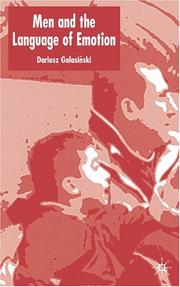
ISBN: 0333995740 Year: 2004 Publisher: Basingstoke Palgrave Macmillan
Abstract | Keywords | Export | Availability | Bookmark
 Loading...
Loading...Choose an application
- Reference Manager
- EndNote
- RefWorks (Direct export to RefWorks)
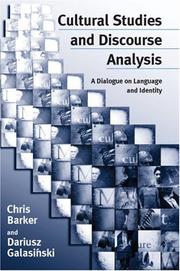
ISBN: 0761963847 1280369922 9786610369928 141293138X 9780761963844 9781446219249 9781412931380 1446219240 0761963839 9780761963837 9781280369926 6610369925 Year: 2001 Publisher: London Sage
Abstract | Keywords | Export | Availability | Bookmark
 Loading...
Loading...Choose an application
- Reference Manager
- EndNote
- RefWorks (Direct export to RefWorks)
This text shows that critical discourse analysis is able to provide the analytic context, skills and tools by which we can study how language constructs, constitutes and shapes the social world.
Language and culture --- Discourse analysis --- Identity (Psychology) --- Ethnicity --- #SBIB:041.AANKOOP --- #SBIB:309H511 --- Ethnic identity --- Group identity --- Cultural fusion --- Multiculturalism --- Cultural pluralism --- Personal identity --- Personality --- Self --- Ego (Psychology) --- Individuality --- Discourse grammar --- Text grammar --- Semantics --- Semiotics --- Culture and language --- Culture --- Verbale communicatie: algemene pragmatiek, stilistiek en teksttheorie, discoursanalyse --- Discourse analysis. --- Ethnicity. --- Language and culture. --- Identity (Psychology). --- Languages & Literatures --- Philology & Linguistics --- Sociolinguistics. --- Language and languages --- Language and society --- Society and language --- Sociology of language --- Linguistics --- Sociology --- Integrational linguistics (Oxford school) --- Social aspects --- Sociological aspects
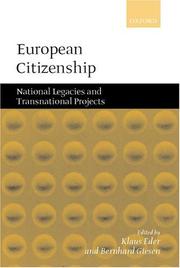
Abstract | Keywords | Export | Availability | Bookmark
 Loading...
Loading...Choose an application
- Reference Manager
- EndNote
- RefWorks (Direct export to RefWorks)
Citizenship --- Group identity --- European Union. --- Citoyenneté --- Identité collective --- Political sociology --- European Union --- Sociolinguistics --- Ethnology. Cultural anthropology --- Pragmatics
Book
ISBN: 9789027206282 9789027288172 9027288178 9027206287 128104251X 9781281042514 9786613773500 6613773506 Year: 2010 Publisher: Amsterdam Benjamins
Abstract | Keywords | Export | Availability | Bookmark
 Loading...
Loading...Choose an application
- Reference Manager
- EndNote
- RefWorks (Direct export to RefWorks)
This volume offers interdisciplinary perspectives on discourses in one national context of post-communist transformation. Proposing a macro-micro approach to discourse analysis and transformation, it examines a spectrum of topics including Polish history, with its 'interpreters'; changes in political bodies and the media, policies of the Catholic Church and the Institute of National Remembrance; xenophobia and anti-Semitism, with the emergence of unemployment and homelessness; experiences of new gender relations and migrations. In effect, drawing upon unique sets of data, the book shows how post-communist transformation can be understood through analyses of the changing public and private discourses. It shows Polish post-communism as a fragile and uneasy transformation, with people and institutions struggling to make sense of it and of life within it. The volume will be of interest to a broad range of social scientists: discourse analysts, sociologists, modern historians and political scientists, as well as to the informed lay public.
Pragmatics --- Discourse analysis --- #SBIB:309H270 --- #SBIB:309H511 --- Discourse grammar --- Text grammar --- Semantics --- Semiotics --- Political aspects --- Politieke communicatie: algemene werken --- Verbale communicatie: algemene pragmatiek, stilistiek en teksttheorie, discoursanalyse
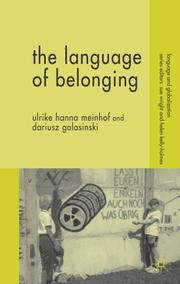
ISBN: 1403907870 9781403907875 0230554377 0230504302 Year: 2005
Abstract | Keywords | Export | Availability | Bookmark
 Loading...
Loading...Choose an application
- Reference Manager
- EndNote
- RefWorks (Direct export to RefWorks)
Comparative linguistics --- Sociolinguistics --- Germany --- Poland --- Group identity --- Language and culture --- Partition, Territorial --- Social aspects --- Language and languages --- Language and society --- Society and language --- Sociology of language --- Linguistics --- Sociology --- Integrational linguistics (Oxford school) --- Divided states --- Partitioned states --- States, Divided --- States, Partitioned --- Territorial partition --- Administrative and political divisions --- Dismemberment of nations --- Culture and language --- Culture --- Collective identity --- Community identity --- Cultural identity --- Social identity --- Identity (Psychology) --- Social psychology --- Collective memory --- Sociological aspects --- Group identity - Germany - Case studies --- Group identity - Poland - Case studies --- Partition, Territorial - Social aspects - Germany - Case studies --- Partition, Territorial - Social aspects - Poland - Case studies
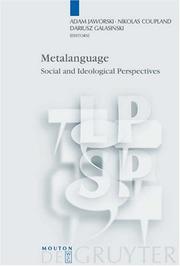
ISBN: 3110178788 311017877X 3110907372 9783110907377 9783110178784 9783110178777 Year: 2004 Volume: 11 Publisher: Berlin Mouton de Gruyter
Abstract | Keywords | Export | Availability | Bookmark
 Loading...
Loading...Choose an application
- Reference Manager
- EndNote
- RefWorks (Direct export to RefWorks)
Metalanguage brings together new, original contributions on people's knowledge about language and representations of language, e.g., representations of dialects, styles, utterances, stances and goals in relation to sociolinguistic theory, sociolinguistic accounts of language variation, and accounts of linguistic usage. Drawing on a variety of data sources such as lay and linguists' metalanguage, the media, parliamentary debates, education, and retail shopping, the book comprises four sections and an integrative commentary. The main thematic parts deal with metalanguage in relation to the following issues: the theory of metalanguage, ideology, social evaluation, and stylisation. Other key themes discussed include constructionism, identity formation, in- and out-grouping, deception, discrimination, manipulation, and the increasing semiotisation of the socio-cultural landscape. Apart from the strictly linguistic concerns, some contributions focus on discourse in a broader sense examining meta-commentary construed in modalities other than language. The book follows from and complements a great tradition of the study of metalanguage, reflexivity, and metapragmatics, and offers a new, integrating perspective from various fields of sociolinguistics: perceptual dialectology, variationism, pragmatics, critical discourse analysis, and social semiotics. The broad range of theoretical issues and accessible style of writing will appeal to advanced students and researchers in sociolinguistics and in other disciplines across the social sciences and humanities including linguists, communication researchers, anthropologists, sociologists, social psychologists, critical and social theorists. The book includes chapters by Deborah Cameron, Nikolas Coupland, Dariusz Galasinski, Peter Garrett, Adam Jaworski, Tore Kristiansen, Ulrike Hanna Meinhof, Dennis Preston, Theo van Leeuwen, Kay Richardson, Itesh Sachdev, Angie Williams, and John Wilson.
Metalanguage --- Sociolinguistics --- Ideology --- Congresses --- Languages & Literatures --- Philology & Linguistics --- Second-order language --- Linguistic analysis (Linguistics) --- Language and culture --- Linguistics --- Sociology --- Integrational linguistics (Oxford school) --- Metalanguage - Congresses --- Sociolinguistics - Congresses --- Ideology - Congresses --- Metalanguage.
| Listing 1 - 10 of 11 | << page >> |
Sort by
|

 Search
Search Feedback
Feedback About UniCat
About UniCat  Help
Help News
News